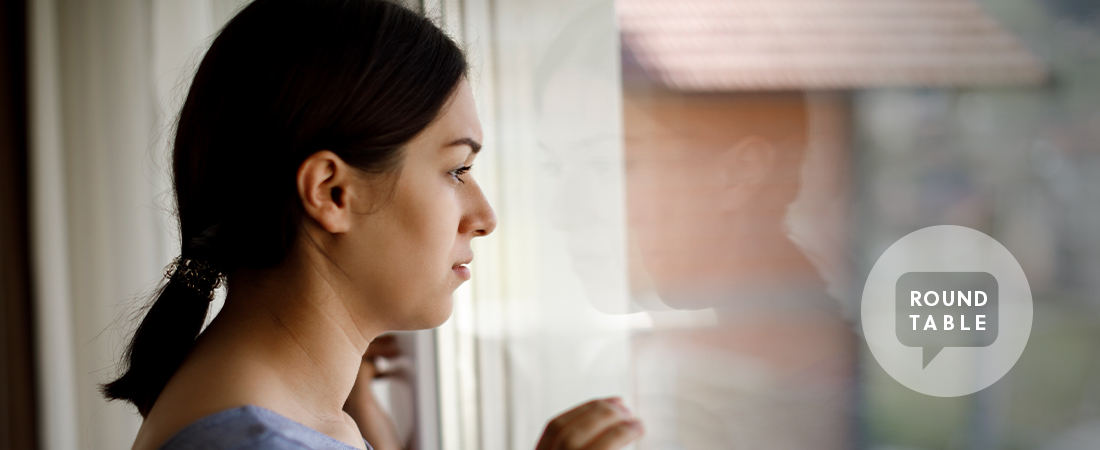Confronting Stress, Substance Misuse during COVID-19

Visit the following sites for more information about public health responses to COVID-19:
Are you feeling stressed during the pandemic? You’re not alone. Recent studies have shown that the disruptions caused by COVID-19 are impacting the mental health of millions of Americans.
How individuals are coping with those challenges is a matter of interest—and concern—for public health practitioners, including EDC’s Chuck Klevgaard and Jennifer Myers. In this discussion, Klevgaard and Myers explore what makes the stressors related to the pandemic so different from those of other disasters. They also offer ways that communities can promote mental health and substance misuse prevention during this time.
Q. What’s unique about the stress people are facing right now?
Klevgaard: One of the things that is unique to this disaster is that folks are dealing with multiple types of losses. Loss of income, jobs, lifestyles, being able to go out their house. There are even deeper losses, too, with regard to the deaths of family members and loved ones. And compounding that loss is that connectedness with other people has also been removed. People need support during a crisis like this.
Myers: The scope and breadth of this pandemic is unique. People are wondering, “When will things feel normal for me and my family again?” They don’t feel like they are in control, and they don’t know how to confront some of the pain that’s happening in their community, their family, or their nation. So I think that contributes to heightened anxiety, awareness, and fears about getting sick.
Klevgaard: Jen makes a good point. When we look at how disasters lead to alcohol abuse or mental health disorders, we really look at two factors: severity and duration. The severity of this pandemic is more pronounced than any other disaster we’ve faced. And in terms of duration—folks will be dealing with recovery for a full year, maybe even 18 months or longer. Having those two things compounded puts people at higher risk for significant health challenges, including increased risk for mental health and substance use disorders.
Q. What are some of the concerns you have about how people are responding given the current stress and uncertainty?
Myers: We know that when we don’t have our routines, and when we can’t meet our basic needs in a healthy way, we see extended impacts on health. Some people may be coping in less healthy ways, such as withdrawing from friends and family, drinking, using substances more, or engaging in unhealthy eating and sleeping patterns. This all has negative impacts on one’s health and mental health.
Klevgaard: Increased use of alcohol is definitely concerning. People are using alcohol as a mechanism for dealing with the stress and grief of this time, but we know that type of drinking is dangerous with regard to the development of alcohol use disorders.
Myers: I’ll also say, though, that people and communities are resilient. And we’re seeing a lot of that now. People are connecting socially through livestreamed concerts. People are volunteering where they can. Mutual aid networks are popping up everywhere. I know here in Columbia, South Carolina, where I live, there’s a group of people making masks. And I just read a story about a woman in New York handing out PPE to first responders. So yes, people are struggling, but people are looking for ways to help, too.
Q. What are some steps that communities can take to promote mental health, wellness, and resiliency?
Myers: It starts with communities staying informed and engaged about what others might be experiencing, especially people from underrepresented populations. So right now, there’s a lot of pressure to reopen the economy, but people in positions of power may see the potential risk of reopening very differently than people who are at the margins of the economy. It’s important that all communities have true representation at the table and respect all voices. Trauma-informed principles of safety, empowerment, mutuality, peer support, and respect of culture can play a key role in promoting resiliency and wellness.
Klevgaard: One of the things that will be incredibly important for communities to do will be to redouble their efforts to educate people about mental health literacy. So things like mental health first aid, or teaching all kinds of folks about addiction science so that we can confront misconceptions, stigma, and discrimination as we move into the response period. There are whole industries that now are looking at and taking on a role that will help prepare folks to become more literate about addiction and mental health.
Q. This is a time of stress and isolation for a lot of people. Are there any positives that we can take away from this health crisis?
Myers: I hope we build on some of the strengths and innovations that we have seen during this crisis, things like increased access to telehealth, reducing barriers to care, addressing inequities through mobile testing sites in certain communities, and coming together as a community. How do we build those into the infrastructure of our communities and of our health system? We can take steps that can prevent significant impacts, such as a rise in suicide deaths, substance misuse, violence, and unaddressed trauma.
Klevgaard: I live in Chicago, and during this time, there are larger numbers of people paying attention to vulnerable populations than ever before. The city is demanding a public health response that deals specifically with, and that allocates resources toward, those populations that are at highest risk for COVID-19. There’s so much attention on disparities in public health now. So I’m feeling good about that because it feels like we can finally have conversations about social and economic determinants of health. Those are conversations that we desperately need to have.
Chuck Klevgaard and Jen Myers recently led the webinar, “The Critical Role for Prevention During and Post Pandemic for the Great Lakes Prevention Technology Transfer Center Network.”

